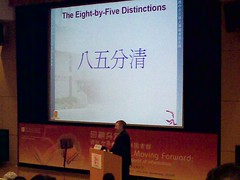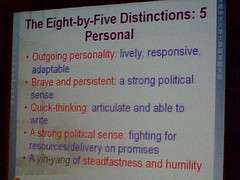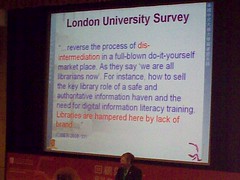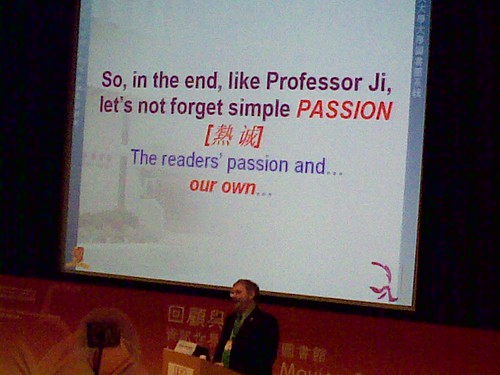Dr. Colin Storey (University Librarian), University Library System, The Chinese University of Hong Kong.
I found myself agreeing with most of what Dr. Storey had to say. And disagreeing with some.
His talk was titled "Ur-librarian to un-librarian, or Ur-librarian to Uber-librarian?"
The parts I agreed
He suggested there were "8 professional distinctions":
- ICT-literate library school graduates
- Need to know about books and intellectual history
- Librarians need to be serious readers ourselves
- Professionally global in perspective
- Have a sense of importance in our work, coupled with common-sense and a sense of proportion
- Totally committed to the free flow of information
- Expert in public relations
- Totally vigilant with our spending of public money


And "5 personal distinctions":
- Out-going personality for outreach
- Brave and persistent
- Quick-thinking and articulate of speech
- Sharp political sense (to survive in senior policy committees)
- Steadfastness and humility

Thinking readers "know everything" is a great mistake.
The parts I disagreed
My understanding of what Dr. Storey terms an "un-librarian" was a person who called oneself a "librarian" but who betrayed the "tradition" of librarianship.
In his paper, he gave the example of how librarians "spend time on un-librarianish things, and less and less on helping the users". He took issue that "librarians are appearing at material handling and logistics conferences along with storage container facility managers" and suggested librarians had better use of their professional time.
Maybe he's relating to a different context, and I don't know what went on during the meetings Dr. Storey mentioned , but I feel librarianship is ultimately about access.
In a sense, libraries are really in the "information logistics" business. Our job
The logistics aspect was part of "Access to Information". If going to meetings with storage facility managers helps, then why not? (Wasting time at unproductive meetings is a separate issue).
Another area Dr. Storey took issue was how "centuries-old cloister of the mediaeval French monk and of the Qing Dynasty scholar is being quickly jettisoned in favour of cafes, sofa beds, multi-coloured neon lighting, concert halls, and wi-fi hotspots so that the digital native kids can get Face Book".
I think we have to separate the issue of "bad taste in furniture" Vs. "the need to re-invent library spaces".
Multi-coloured neon lighting? Maybe that's questionable.
But how are cafes wrong? Or Wi-fi access for that matter? I think we have to judge the decisions on space planning and design on customer's needs and relevance. I can't make the connection with those examples and the acts of un-librarianship that Dr. Storey is suggesting.
If my notes are accurate, in his presentation, Dr. Storey says "librarians should try new things and move forward. But still have to cherish our traditions."
I totally buy that. But I think the contention is "What is our tradition?"
Seems to me it depends on how broadly (or narrowly) we choose to define what is tradition.
Additional "five professional distinctions"
Dr. Storey ended his presentation by suggesting the "8 x 5" distinctions should be "8 x 5 x 5". The additional five being:
- To be more informal in formally organising access
- Not to dumb down to get readers
- Remain non-commercial and/ or unbiased
- Not disclose patron history
- Try to assist in searching for and access to "library-watermarked sites" (approved sites?)
So, I don't quite agree with everything Dr. Storey said.
But I totally agree with his last slide:

[Next: Part 4]

Hi Ivan,
ReplyDeleteAlways enjoy reading your blog and thanks for sharing your experience from time to time!
Thanks for posting some ppt slides from Dr. Colin Storey (University Librarian), University Library System, The Chinese University of Hong Kong.
The Chinese Characters on the slides attracted my attention. Somehow I think it is a new trend, though he is not the first one to do so. I feel excited and passionate about the change, maybe Chinese is something I enjoy reading especially in the context of Librarianship.
I think the reason Chinese Character is added is:
* Dr Colin Storey is the University Librarian from Chinese University of Hong Kong.
* He is addressing his speech to HKLA members who are mostly bilingual. (HK is part of China now!)
I doubt that if he is in Singapore, it may not be that well received as many of our librarians are not able to read the text and appreciate the beauty of the expression in the other language.
Now lets me move on...
I agreed with most of your views (pro and against his).
Some thought cross my mind when I read your post and would like to share it with you:
... "What is our tradition?"
... "But how are cafes wrong?"
In library tradition, we never have cafe, nevertheless, tradition is what is being created by our pioneers.
As librarians, we have the obligation to follow tradition.
and
As librarians, we also should have courage to :
* discard old tradition
* create new tradition
If what we dicard or create benefit our reader at large, we should have the courage to do so.
What we have created now will become the tradition for our next generation!
So cafe is to stay as new bench mark in public libraries, no one will disagree now in Singapore, esp, our readers.
it become a trend for academic libraries too, for examples, NIE and some polytechnic libraries already having cafe for years!
In the future, readers may feel that something is missing if they can't find a cafe in any Library.
On the other hand, being a Singaporean, most of us are used to Cafe, yet I wish that Libraries in the near future can have Ya Kun toast bread, or something with a local favor instead of just Cafe.
Ya Kun toast bread, Kopitiam or Toast Box, etc... are more traditional as compare to Cafe!
Beside, our government support local SME, and libraries should support local talent/entrepreneur and not just imported brand.
I think most of the readers will welcome the change if they can have a choice to vote!
Thanks for your thoughts, Dexterine :)
ReplyDelete>>>
If what we [discard] or create benefit our reader at large, we should have the courage to do so.
>>>
My point exactly!